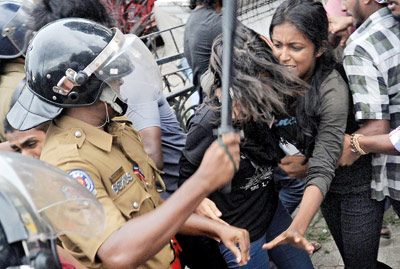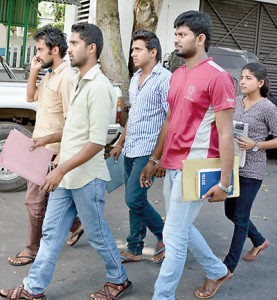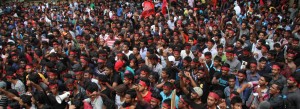News
Flurry of investigations into bloody attack on students
A week after students and police clashed at Ward Place, Colombo 7 three separate committees are trying to determine causes and parties responsible for the key issues that led to the fracas in which at least 30 students were injured.

The clash that has resulted in many probes. The student in the centre Shashini Sandeepani sustained severe injuries. Pic by Amila Gamage
The committees were set up by separate parties including Prime Minister Ranil Wickremesinghe after Higher National Diploma in Accountancy (HNDA) students took to the streets on October 29 demanding reactivation of a circular issued in 1990.
According to Higher Education Minister Lakshman Kiriella, the students had been aware that a decision had been taken to restore the 1990 circular when they arrived for the protest – a claim disputed by the students.
Higher Education Ministrysecretary D.C. Dissanayake confirmed that at a meeting held hours before the protest, the authorities had decided that a paper seeking the restoration of the previous circular was to be submitted to Cabinet (see tying story).
However, the decision taken had not been conveyed to the students and the ministry had not been aware about the impending protest later in the day.
The Sunday Times last week exclusively reported that the Director-General of the Sri Lanka Institute of Advanced Technological Education (SLIATE) Dr. Hilary E. Silva had failed to inform students about the decision to resolve the matter. The HNDA diploma is offered by the SLIATE.

Students took to the streets this week (above and below). Pix by M.D. Nissanka and Indika Handuwala
The 1990 circular issued by the Public Administration Ministry stated that the diploma was considered an alternative qualification to degrees offered by state-run universities. In 2014, the circular was cancelled by the Public Administration and Home Affairs Ministry (see separate story).
The students’ demand for the reinstatement of the circular turned into a bloody brawl on October 29 when riot police used teargas and water cannon to disperse protesting students whose demonstration had been causing a traffic jam at the Town Hall.
Video footage, photographs and eyewitness reports showed students struggling to break away from the clash while some were pinned down by police officials and beaten.
Government and independent bodies appointed committees to probe the incident. A special committee headed by Dr. B.M.S. Batagoda, Secretary of the Ministry of Power and Renewable Energy Resources, who has held senior positions in other institutions and ministries including the Ministry of Public Administration, was appointed by Prime Minister Wickremesinghe early this week.
Dr. Batagoda told The Sunday Times that the main objective was to see why and how the incident took place, who was responsible and what needs to be done to avoid an incident of this nature.
Beside this, Dr. Batagoda and his team will investigate why the police took the drastic action that resulted in student injuries and whether police need proper training in handling such issues. The comprehensive report is due on November 20.
 A separate committee was convened by the National Police Commission (NPC) after an Asian Human Rights Council complaint. Acting Inspector-General of Police and Senior Western Province DIG Pujith Jayasundara and several other police officials were questioned about the assault on students.
A separate committee was convened by the National Police Commission (NPC) after an Asian Human Rights Council complaint. Acting Inspector-General of Police and Senior Western Province DIG Pujith Jayasundara and several other police officials were questioned about the assault on students.
“Statements of affected students were recorded. The committee also visited the female student who was hospitalised to get her version,” Acting Secretary to the NPC Ariyadasa Coorey said.
The female student, Shashini Sandeepani, was severely injured during the incident and hospitalised twice for treatment.
Mr. Coorey said that the committee was awaiting further information from individuals regarding the clash. Anyone with information should fax it to the NPC on 011 268 33 07 or email info@npc.gov.lk
“If anyone wishes to provide us information in person we will be awaiting them from 9am to 4pm at the Commission on Monday (November 9),” he said. Their report is due in two weeks.
As these investigations are underway, Cabinet this week approved the students’ demands and made HNDA an alternative qualification to the B.Comm. degree offered by state-run universities.
The cabinet paper approved at Thursday’s meeting said that the 1990 circular was being reactivated as “disappointments have occurred among those diploma holders as the demand from private sector job opportunities have reduced”.
It said HNDA students “face difficulties in applying for public sector vacancies” as the 1990 circular considering the HNDA course as an alternative qualification to B.Com degree was nullified last year.
However, HNDA Convener Dhammika Ruwan Kumara, says the students do not view the move as a favourable response to their grievance.
“We can’t say anything until a gazette notification regarding the matter is issued confirming this move,” Mr. Kumara said.
He added that students had previously called on several officials to lobby for their demands but had not been given satisfaction.
On October 29, he said, they had gone to the Ministry of Higher Education to discuss the matter with the minister and other senior officials.
“The students were disappointed by the way we were received,” he said.
First-year HNDA student Buddhi Ishara from Kurunegala said riot police had arrived and attacked the students with teargas.
“I was unconscious and fell.
Some male students came to help me but they were attacked by the police officials. When I got up and ran, one hit me on the back,” Ms. Ishara said. She said the protest march had been organised because the students had felt victimised by the sudden decision made by authorities last year.
Aruna Pradeep from Balangoda, a second-year HNDA student, said police had attacked the students for 30 minutes.
“We were running around and pleading from the police not to hit us.
It was really hard because of the teargas.They caught me and took me to the Bambalapitiya Police Station,” Mr. Pradeep said.
After the attack, 12 students were admitted to the hospital and 39 students, including five females and two monks, were taken into custody and produced in the Colombo Magistrates Courts.
Meanwhile the Human Rights Commission, which is also conducting an investigation into the student assault, has finished gathering statements from both students and police.
The commission was looking at the police attack on students. On Thursday, the HRC recorded a statements by Acting IGP Jayasundara.
“The police responded well during our investigation. They provided necessary reports and documents that were needed,” the organisation’s Director of Inquiries and Investigation, Sithara Thambiliyagoda, said.
She said the HRC was awaiting medical reports from the National Hospital of Sri Lanka where the students were treated.
There are claims that Frontline Socialist Party (FSP) Central Committee member Kumar Gunaratnam had been arrested due to the protest launched by HNDA students.
Stating that the students had a hidden agenda behind the protest, former Higher Education Ministry (H.E.M.) secretary Dr. Sunil Jayantha Nawaratne said that when in 2014 the circular in question was cancelled there had been several discussions to rectify the matter.
“We were in the process of solving this issue. We even appointed a committee which said that the circular can be reactivated after studying HNDA course material,” Dr. Nawaratne said.
He added that in a separate programme the HEM was planning to add another year to the diploma and award degrees to the students.
“But when the government changed this did not happen,” he said.
| Police used batons after being stonedPolice baton-charged Higher National Diploma in Accountancy (HNDA) students when the protesters attacked them with stones and other objects, a senior police official claimed. He said the police first attempted to disperse the protesting group with water cannon and teargas. When the students fought back, the police used batons to control them. “The police did not have a court order to control the protesters but under the Criminal Procedure Code Section 95 there is a legal provision allowing police to use actionwhen public peace is disrupted,” he said adding the police had been attempting to ease traffic flow blocked by the protest. “Under this provision the police can fairly use necessary force, and that is what we did,” he said.
Committee had acceded to students’ diploma demand A special committee appointed by the Minister of Higher Education and Highways Lakshman Kiriella to submit an internal report regarding the Higher National Diploma in Accountancy (HNDA) issue concluded that the diploma can be considered an alternative to B.Comm. degrees offered by universities. Committee member Prof. P.S.M. Gunaratne, Vice Chairman of the University Grants Commission, said the committee had reached that conclusion after analysing the course material, student statements and comments by Sri Lanka Institute of Advanced Technological Education (SLIATE) officials. “Students who are selected to follow HNDA are qualified as those selected to state-run universities. They are ones who passed GCE Advanced Level but failed to enter universities after district population criteria and students from difficult learning areas are selected,” Prof. Gunaratne said. Meanwhile, explaining that the authorities were only reactivating a past circular, Secretary to the Ministry of Higher Education D.C. Dissanayake said the government was not expecting to replicate this move with other diplomas offered by state institutions. The 1990 circular stating that the HNDA was considered as an alternative qualification to degrees offered by state-run universities was introduced to curb the shortage of similar graduates in state institutions. “In 2014, it was cancelled because there were enough graduates to fill vacancies. In place of this circular the then Public Administration and Home Affairs Ministry introduced a new circular saying that it was up to recruiting institutions to consider if HNDA students could be recruited or not depending on their Schemes of Recruitment,” Mr. Dissanayake said. He said when students protested against this, steps had been taken to resolve the matter but the previous government had been swept out of power while it was still in the process of taking action. Dr. Sarath Amunugama who was in charge of the ministry later also attempted to provide a solution to the matter but failed as a result of elections this year. And under the new government institutions such as SLIATE were put under the Ministry of Youth Affairs and Skills Development. “But when the students protested against this we took them back under our ministry,” he said. Even the former name of the Ministry of University Education was changed again to Ministry of Higher Education. “The minister and other officials were discussing with university authorities and students about their hardships and recommendations. Then when we got these institutions under the ministry on 15 September the minister wanted to discuss their issues too.” However while the discussions were underway the protest was organized by the students. “On 29 we were having discussions with SLIATE directors in our office in Battaramulla. They did not inform us about this protest. If we were informed this clash could have been avoided,” Mr. Dissanayake said.
Gunaratnam arrest ‘linked to protest’ The arrest of Frontline Socialist Party (FSP) Central Committee member Kumar Gunaratnam is related to the recent protest launched by HNDA students, FSP Politburo member Duminda Nagamuwa claimed. Mr. Gunaratnam was arrested by Kegalle police on Wednesday (04) while he was visiting his ailing mother at her house. The Kegalle Magistrate remanded him until November 18. Mr. Gunaratnam, a former JVP member, decades ago fled the country for political reasons and became an Australian citizen. He subsequently returned clandestinely to Sri Lanka and in 2012 was arrested and deported on charges of overstaying his tourist visa. He returned to the country in January this year in the run-up to the presidential election. FSP members said the arrest was politically motivated and that the government wanted to stop students and the public coming out to protest against problems relating to the government. “After the present government came into power there were a series of incidents that took place. They attacked the university students who protested on March 31, protestors of the University Bhikku Federation on April 30and protestors inKotakethana,” Mr. Nagamuwa said. He added that during the recent assault on HNDA students the primary plan of the government was to attack the students until they yielded but this had failed due to a public outcry. “This shows how this government will react in future when there are more protests organised against them. We ask those who supported the democracy and voted for this government to open their eyes and look at what is happening,” he said. |


